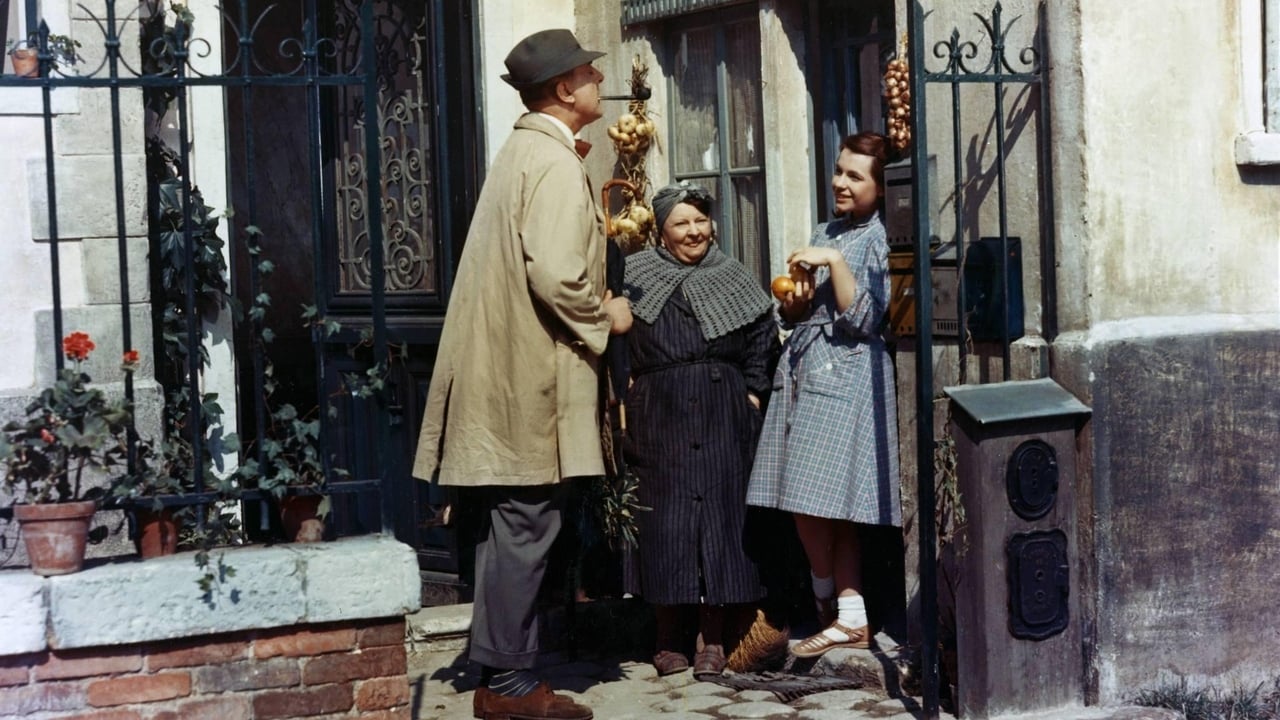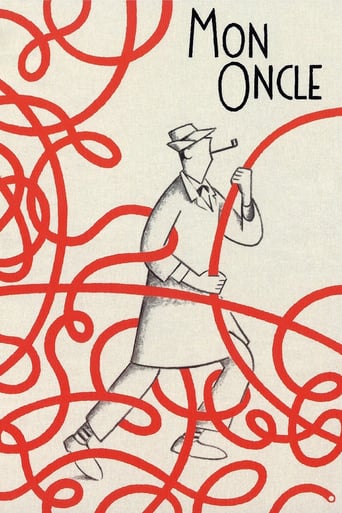LouHomey
From my favorite movies..
Tedfoldol
everything you have heard about this movie is true.
Breakinger
A Brilliant Conflict
TaryBiggBall
It was OK. I don't see why everyone loves it so much. It wasn't very smart or deep or well-directed.
evanston_dad
Jacques Tati's Academy Award winner for Best Foreign Language Film from 1958 is a very funny ode to a simpler and more organic way of life in the face of increasing technology and sterility. People describing it will inevitably use words like charming and quirky. I might also throw in delicate and possibly even wistful. Most of the movie plays like a silent comedy, and the majority of the humor comes from sight gags and physical pratfalls. I do think it overstays its welcome a bit by the time it's over. It's like ordering a dessert that you really enjoy but that is just two or three bites more than you want.
dmmsj0
For those expecting the sweet bumbling comedy of Tati in this last Hulot film, you won't be disappointed. However, if that's all you look for, you will miss out. This brilliant conflation of Hulot humor and social satire has deservedly won many awards. Tati is noting the passing of a sweeter kind of life, one in which Chaplin and others devoted to a kind of sadly benign view of humanity has become replaced by the facile, superficial world of latter-day technology. The scenes in which visitors must maneuver an absurd path of stepstones...the ridiculous devices the inhabitants not only make use of for every day activities but accept quite readily as normal, the thwarting by the blithe nonsense of his relatives of every attempt at real human contact by Hulot, the utter pointlessness of their lives in contrast to the emotional connections a loved one offers, and of which they are oblivious-- all this combines to indict our technology driven culture in a way only satire can. Tati would have a field day with our even-more-technology-enslaved culture, now so constantly in communication via cell phones but with nothing much to say on them. Come for the hi-jinks of Hulot, stay for Tati's critique, all the more effective because it's concealed in the attractive garb or a favorite comic character. I laughed uncontrollably, butalso I cried.
lasttimeisaw
Jacques Tati's Oscar BEST FOREIGN LANGUAGE PICTURE champ, MON ONCLE is his third feature and the first in color, which bestows him a perfect implement to visualize his ingenuity of chromatic outlandishness and architectural brainwave, on top of his already honed-up dexterity in his sui generis comedic bent. The titular uncle, it goes without saying, refers to Tati's alter ego Mr. Hulot, and his nephew is the 9-year old Gérard Arpel (Bécourt), who lives in an eye-catching modern villa (reckoning its time, how incredible it still can sweep new audience off their feet just like that, almost 60 years since its debut) with his parents (Zola and Servant) in Parisian suburb, an outré construction constituted with geometric motifs and glaring color schemes, later in the movie, against a nocturnal background, the house resembles a giant robot with round eyes where two eyeballs bob up intermittently to check the noise Mr. Hulot makes. Its garden is divided into pockets of different colors (green lawns, pink and yellow sands etc.), adorned by stepping stones (definitely not suitable for walking), and in the center there is a fish- shaped fountain would become an ineffable running gag because Ms. Arpel would only switch it on when there are visitors, neither for her own kin, aka. her brother Mr. Hulot, nor a fruit vendor. Equipped with an über-modern kitchen, where everything is run by either a button (e.g. to flip the steak) or automatic sensors (the cupboard conundrum stymies Mr. Hulot), the house permeates with a middle-class complacency borne out of the industrial wealth. Whereas for Mr. Hulot, he lives, in company with other households, in a slightly decrepit building which has its own idiosyncratic attribute, the building's windows, staircases and landings are entwined in an unconventionally genius layout, fashioned by Jacques Lagrange (as one of the key artistic collaborators), it is absolutely an apotheosis (along with the villa) in the strand of contemporary production design. Same can be extolled to costume designer Jacques Cottin, whose creation tallies with the film's startling color and geometric pattern and whimsically fleshes out a farcical tinge of bourgeois wackiness, a scrumptious grace note is the middle-aged neighbor (Marie), whose grandiose appearances in bamboo hat and later as a"carpet" are simply divine to gawp. The satire of preferring superficiality and technology to utility is very much on the nose, and indeed that is why Tati's work is so admirably pellucid in reflecting his own frame-of-mind, it is a light comedy, the plot and dialogue barely exist, Mr. Hulot is perpetually the oddball finds himself difficult to fit in anywhere, yet the film is anything but frothy, each and every vignette is punctiliously devised to perfection under a good-natured timbre with wry humor, in the end, it is the familial bond that matters, a boy finds a similar vibe with his priggish father while seeing off his favorite uncle at the station, the ending anticipates Tati's next pièce de résistance PLAYTIME (1967). A high priest of post-modernism, Tati's legacy in cinema cannot be more overstated in his absolute talent in balancing quotidian absurdity with a high-end conception which stands out as a universe of its own, a virtuoso cinematic comedian-starchitect first and foremost, Tati takes up the baton of those eminent names before him like Lumière Brothers, Keaton and Chaplin, and arguably he has gone further and bolder.
ma-cortes
Amusing and lively movie with enjoyable humor in which Hulot is back again in this slapstick and splendid comedy . The second of Tati's cinematic romps in which lovable Mr. Hulot (the first was ¨Mr Hulot's holiday¨ in which to be found in vacationing at a holiday seaside resort) , Tati's recurrent of the common person confronted with increasingly mechanized and depersonalized society where he accidentally originates destruction , disaster and catastrophic events . This time around , the botcher but beloved Hulot is taken under the wing of his oh-so-chic in-laws , -Jean Pierre Zola- , who live in a futuristic suburban mansion dominated by every conceivable form of embarrassing electronic gadgets . Needles to say , Hulot's old world mentally can not adapt to this strange new environment and the result are , to put it mildly , horrific . As Mr Hulot is back again in this surprising comedy , as he attempts to keep in a sterile as well a bizarre house but all of its objects , furniture , fountain , garden , automobiles , garage seem to conspire to thwart him at every turn . Furthermore , Tati's bicycle does a fine job in a major supporting role . This delightfully lighthearted is plentiful of original sketches and fine sentiment . From the beginning to the end the good humor and bland comedy are continued . The film blends tongue-in-cheek , irony , giggles , joy , jokes , social critical and is pretty bemusing and entertaining . In spite of being occasionally disorientated and runtime is overlong , the run is about two hours , isn't boring neither tiring , but funny . The gentle humor developed in the film is clever and thoughtful and the comical numbers vary between slapstick and surrealist . The plot is plain and simple , about the natural natural comedy to be found in factory , home and meeting between Hulot and his nephew . Although partially dubbed , this movie has a mime quality that is marvelous and magical . Jacques Tati is extraordinary as Mister Hulot , this remains one of Tati's most rewarding movies , an universally appealing blend of satire , social critique and good feeling . The great Tati is top-notch with his slapstick and continuous botchers which lead to some really fun moments . Direction and interpretation by Jacques Tati is magnificent and wonderful . Alain Romain's score -Tati's habitual musician- is agreeable and cheerful . The motion picture received awesome reviews and deserves the complete knowledge because there are amount chuckles and entertainment . It is also the only Tati picture to win the Academy Award for best foreign movie . The flick was stunningly directed by Tati who also made other masterpieces , such as : ¨Jour De Fete¨ , ¨Playtime¨ , Traffic¨, and ¨Parade¨ . All of them plenty of visual gags and situations worthy of the great silence comedians and the viewing is more than enough to provide lots of laughs . The picture is nowadays considered a European cult film .

